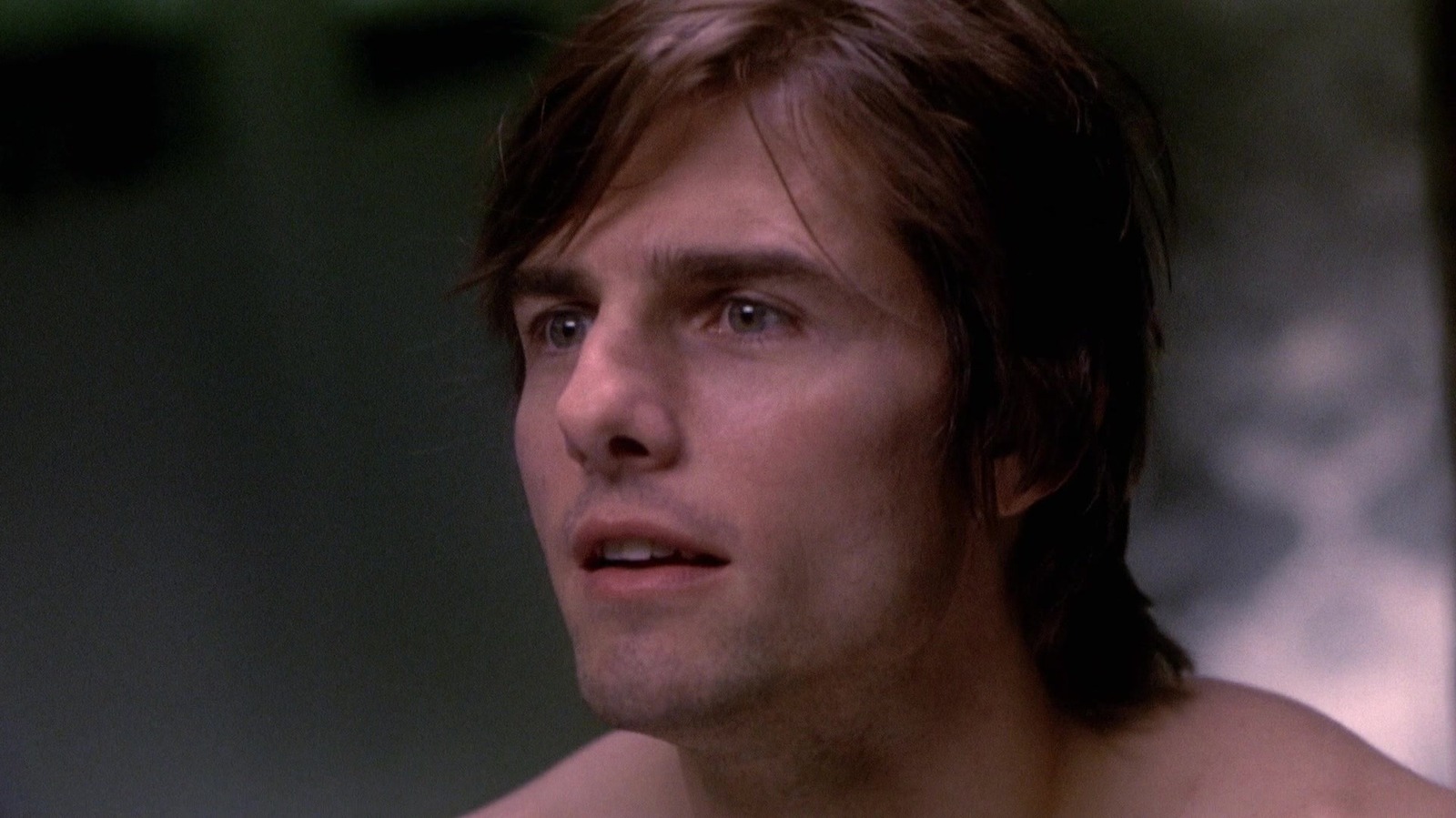What you need to remember about the plot of Vanilla Sky
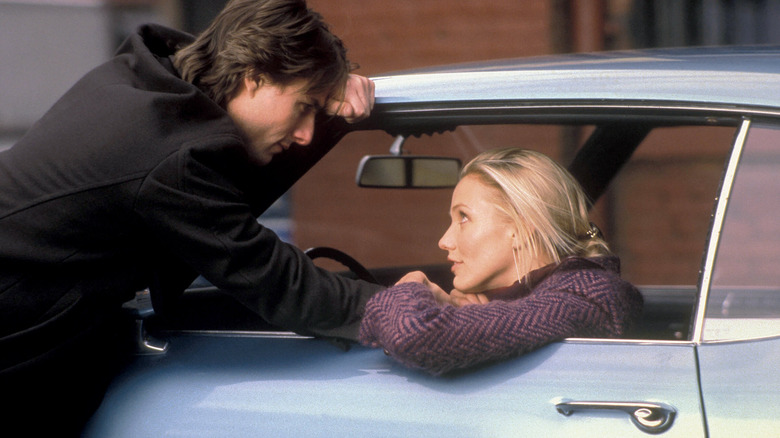
Paramount Pictures
David Aames (Tom Cruise) is a narcissistic playboy just living the dream. He’s handsome, rich, lives in a plush Manhattan apartment, and holds the controlling stake in a publishing empire inherited from his dad. He also sleeps around with the women of his choice and we meet him as he is giving his latest conquest, Julie Gianni (Cameron Diaz), the brush-off.
Advertisement
Meanwhile, we also know something terrible has happened. We keep cutting away from David’s carefree existence to him in prison wearing a creepy mask and talking to Dr. Curtis McCabe (Kurt Russell). David is awaiting trial for murder and McCabe must file a report on his psychological state. David insists that his board of directors have framed him in order to seize control of the company.
The big turning point in David’s life comes when his best friend, Brian Selby (Jason Lee), arrives at his birthday party with a new friend, Sofia (Penélope Cruz). Julie also gatecrashes the celebration and gets very jealous when David and Sofia are instantly smitten. Their budding happiness is cut short the next morning when Julie, clearly stalking David, offers him a ride. Fatally, he gets into the car.
Advertisement
Julie drives the car off a bridge, killing herself and severely injuring David. His doctors patch his face back together, but he is left badly damaged physically. His appearance unnerves Sofia when he asks her for a date, and their night out ends badly with David passing out drunk and rejected in the street. But Sofia has a change of heart, and they start a relationship together, quickly falling in love.
Back in prison, McCabe asks about Ellie, a name that David has been crying out in his sleep. He also insists that David’s face is perfect under the mask. This triggers another memory as David’s doctors are miraculously able to perform reconstructive surgery and return his visage to normal. Everything seems well until things take a sinister turn; David experiences flashbacks to his disfigurement and Julie apparently returns from the dead to take Sofia’s place. David assaults her but she doesn’t press charges. He then hits a bar and gets approached by a stranger (Noah Taylor), who reveals that David is somehow able to control the world around him. Scared and confused, David ends up killing Julie/Sofia and gets arrested for murder.
What happens at the end of Vanilla Sky
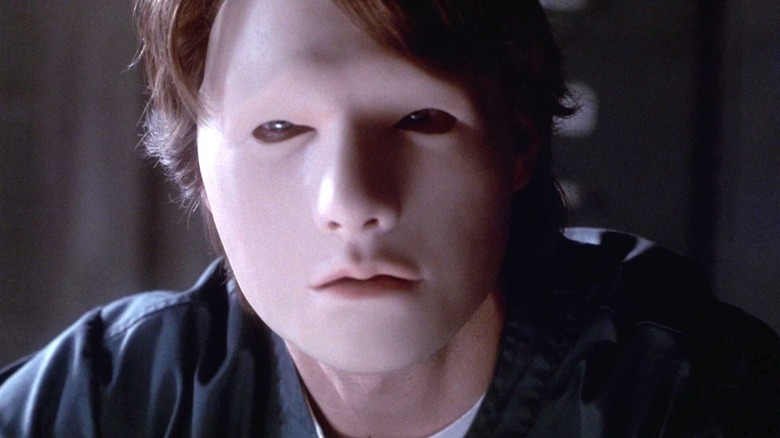
Paramount Pictures
Talking to McCabe finally enables David to admit he killed Julie/Sofia. But as the trial awaits, but David gets a crucial clue to the puzzle when he sees a TV advert for a cryogenics company called Life Extension featuring the stranger from the bar. Realizing that Ellie, or L.E., is an acronym, McCabe takes him to the company’s offices to find out the truth. Meeting with sales rep Rebecca Dearborn (Tilda Swinton), David remembers that he signed up for a procedure in which clients are frozen at the moment of death until a cure for their ailments can be found in the future. For an extra fee, a Lucid Dream option erases all memory of their demise so they can transition seamlessly into a fantasy of their own imagination. Dearborn admits that risks are involved because the subconscious mind can be a little tricky.
Advertisement
It dawns on David that this visit is also part of his dream and he runs away, shouting for Tech Support. He duly gets his wish: Edmund Ventura, the stranger from the bar, appears again and whisks him to the rooftop in an elevator. Ventura explains that 150 years have passed while David was put in a deep freeze. He never saw Sofia again after the night out and he subsequently died by suicide after signing up for Life Extension. Once he entered Lucid Dreaming, his mind constructed the perfect existence, borrowing bits and pieces from pop culture and creating the fatherly figure of McCabe in the absence of his real dad.
Now that surgical advancements on the outside can successfully fix David’s face, he is presented with a choice. He can stay in the lucid dream with all the bad memories erased once again, or he can wake up and start a new life in the real world. McCabe appears on the rooftop and pleads with David not to listen, insisting that the whole thing is indeed a conspiracy.
Advertisement
David decides that he doesn’t want to live in a dream anymore. After kissing his idealized version of Sofia goodbye, David takes a literal leap of faith, jumping from the roof of the building. His life flashes in front of his eyes before he hits the ground. Echoing the first moments of the movie, a woman’s voice says, “Open your eyes.”
What the end of Vanilla Sky means
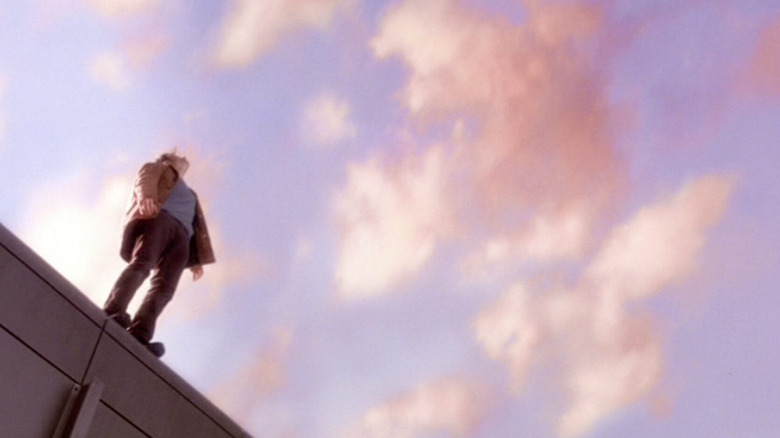
Paramount Pictures
“Vanilla Sky” begins with David waking to a voice recording on his alarm clock gently bidding him to open his eyes. Those three words are key to the whole movie: Not only because his lucid dream becomes a nightmare that he struggles to wake up from, but also in the sense that his life before the accident was an unsustainable fantasy. The death of his parents 10 years earlier locked him into a state of arrested development, prompting him to treat women as playthings and his work environment like a playground. He lived life as if there was no tomorrow.
Advertisement
But there are also clues from the get-go that the party can’t last forever, from the film’s autumnal hues to the rogue gray hair in David’s lustrous locks. The opening dream sequence with David running through a deserted Times Square hints at a loneliness that he uses his glamorous flings to keep at bay. “Isn’t that what being young is all about? Believing secretly that you would be the one person in the history of man that would live forever?” he asks McCabe early on. Of course, if youth is believing you might just be immortal, then part of growing up means acknowledging that life is finite and your actions have consequences for yourself and those around you.
David learns this the hard way. Even after his overnight meet-cute with Sofia gives him a different perspective, he still gets into the car with Julie on the promise of casual sex. That decision destroys his life and means he never sees Sofia again. His wealth allows him to escape the rejection caused by his injuries and his culpability for Julie’s death, but he can’t give his subconscious the slip. His guilt and self-loathing bubble to the surface and turn his lucid dream into a nightmare, and flashbacks to his disfigurement represent what he knows deep down: He’s a shallow and ugly person behind the good looks and superficial charm.
Advertisement
By the time we come to the rooftop finale, David is ready to make a grown-up decision. He has the option to carry on in the lucid dream as if nothing bad has happened, but he has matured enough to realize it would be perpetuating a lie. David is now ready to take his chances and face uncertain reality with his eyes wide open.
Another possible explanation for the ending
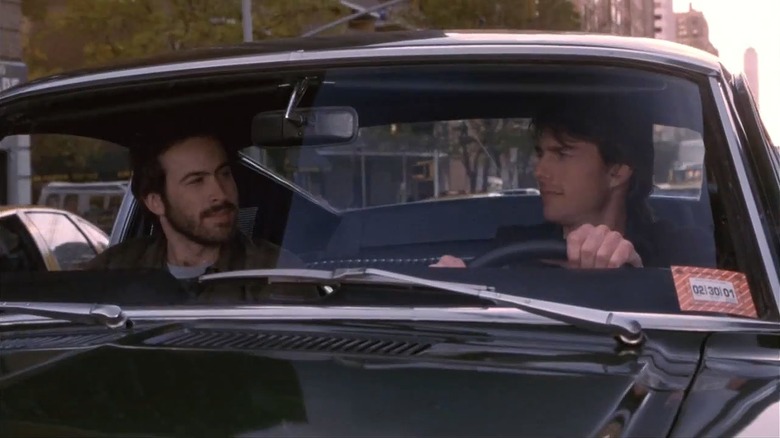
Paramount Pictures
“Vanilla Sky” is often regarded as a sci-fi remake better than the original, but I can’t get over the feeling that Cameron Crowe bungles the conclusion. In the first hour or so, he sticks to an almost shot-for-shot rendition of “Open Your Eyes,” but things get confusing when he deviates towards the end and starts indulging in his usual pop cultural obsessions. The finale is pretty garbled, and I always got the feeling that Crowe became more interested in flicking through his LP collection for the perfect needle drop rather than wrapping things up in a coherent manner.
Advertisement
Crowe has said that he intended “Vanilla Sky” as a dialogue with “Open Your Eyes,” adding to the suspicion that he’s pretty non-committal about the ending. He has even speculated about several other possible interpretations of the movie. The first and most obvious reading is that Edmund Ventura is telling the truth and everything went down exactly as he says in the final scene. All the evidence needed to support this interpretation is in the film, even without the additional information provided in the alternate ending (more on that in a minute).
Crowe’s other possible solutions are more of a stretch. One option is that the whole film is a dream occurring while David is in a coma, suggested by a sticker on his windshield reading 02/30/01. It’s an impossible date and provides a tenuous clue that even the sequences portrayed as David’s real life before the car crash are also part of a dream. On a similar tack, everything after the crash could be hallucinations caused by the drugs prescribed after David’s life-saving surgery.
Advertisement
A more interesting alternate reading is that everything is the plot of a novel written by Brian Shelby. That might seem outlandish at first and there is little evidence to back it up in the movie, but it would make sense. Brian is clearly envious of his best friend — early in the film when they almost get in a car wreck, Brian quips that David’s life flashed before his eyes instead of his own. There is also some resentment, especially after David swoops in and takes Sofia away from him. So, the whole story could be Brian getting a little revenge on his playboy pal by punishing him in his book.
What the cast and crew of Vanilla Sky said about the ending
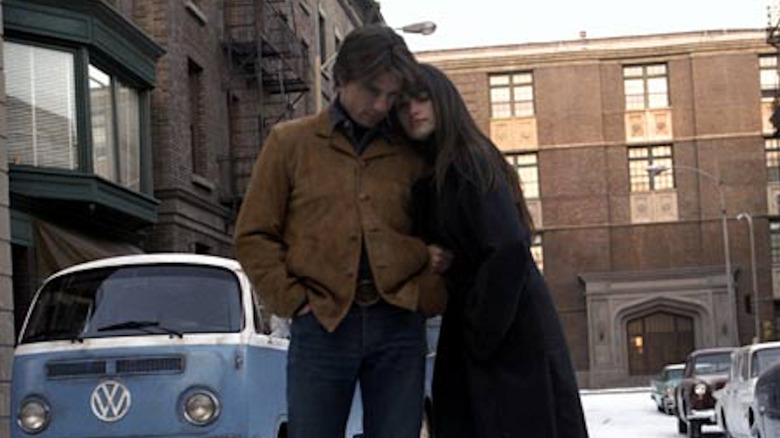
Paramount Pictures
“Vanilla Sky” is a flawed sci-fi masterpiece with an ending we love to complain about, and Cameron Crowe has discussed the conclusion in terms of its two different versions. The alternate ending has more exposition, but Crowe decided to go with a more open-ended conclusion with less explanation after test screenings (via Film School Rejects):
Advertisement
It wasn’t like the [original] ending was compromised; it was just spelled-out a bit more. Over time I think people are more open to the questions lingering. [In a] Post-‘Sopranos’ world, where it can end with Tony Soprano cutting to black, people are more attuned to bringing impressions to a shocking ending. The ending we ended up doing was a little more making sure we put a spotlight on what we wanted to say.”
Tom Cruise co-produced the film as well as taking the lead, and he was instrumental in getting it to the screen. For him, the Spanish original touched upon universal themes and presented an opportunity to create a Hollywood blockbuster that would really make people think. He’s extremely enthusiastic about the open-ended nature of the remake (via Female.com):
Advertisement
“It was a film that was constructed with that ride if you want, that pop culture ride but yet underneath there are some things you can walk with and it’s a film you want to see before dinner so you can sit down and talk about it.”
“Vanilla Sky” feels like an end-of-an-era movie, perhaps the true end of the ’90s, summed up by the World Trade Center being visible in the background in the final scene. Released just two months after the 9/11 attacks, Cameron Crowe made a conscious decision to leave the Twin Towers in the film (via International Business Times):
“The idea of wiping them away by the computer — I couldn’t do it […] They’ve already been taken away once; they’ll stay in the movie. Hopefully, the audience will understand it’s a tribute.”
Vanilla Sky’s alternate ending
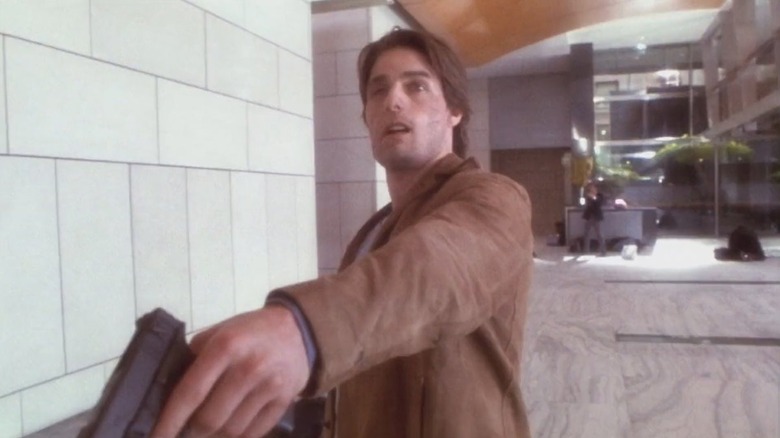
Paramount Pictures
The alternative ending to “Vanilla Sky” doesn’t change the outcome, but it does make things a lot clearer. I’m usually a fan of open-endedness, and Cameron Crowe deserves some credit for presenting a more challenging conclusion in the theatrical cut, but there is also a big difference between ambiguity and confusion. I saw the movie when it first came out, and I’ve seen it several more times over the years, but I’ve always found the last act to be frustratingly hectic and a bit of a headache to sit through. That’s why, for me at least, the alternative ending is far more enjoyable.
Advertisement
Running about five minutes longer than the regular version, the discarded conclusion sticks more closely to Alejandro Amenábar’s “Open Your Eyes.” After the meeting with Life Extension rep Rebecca Dearborn, we get an extra scene in a bathroom with McCabe trying to convince David that Life Extension is a con. That’s followed by a comical lobby shootout between David and a cop played by Michael Shannon, which helps explain why the actor is cast in what seems like a bit-part in the theatrical cut. Once David gets his Tech Support, we get further exposition from Edmund Ventura and more of McCabe coming to the realization that he may be a figment of David’s imagination. Lastly, the alternate ending gives us a longer and more satisfying final goodbye between David and Sofia.
Advertisement
This extra explanation helps highlight some key details which are not so obvious in the shorter version. In the bathroom scene, David refers to himself as a monster when he sees his disfigured face in the mirror, emphasizing his feelings of self-loathing. McCabe doesn’t see the scars, however. He sees David as perfect, reiterating Ventura’s point that the psychologist is a supportive surrogate father created by David’s subconscious, tapping into the daddy issues that aren’t made overtly clear in the theatrical cut. Ventura also places a little extra emphasis on David’s terrible decision to get into the car with Julie, hammering home the point that he has been a victim of his own immaturity. None of this makes a huge amount of difference in the way “Vanilla Sky” plays out, but the slower pace allows everything to sink in better than the shorter version’s breakneck dash to the credits.

